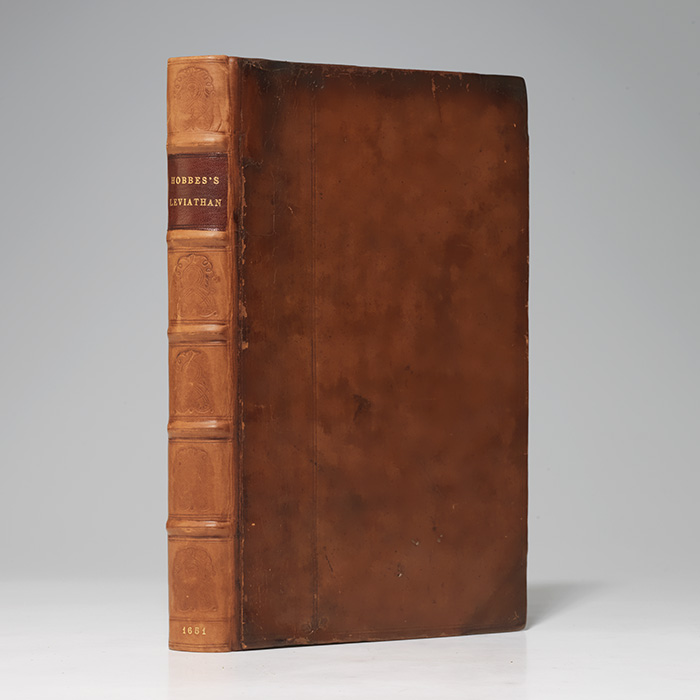
"A POWERFUL INFLUENCE ON THE FRAMERS OF THE CONSTITUTION": FIRST EDITION OF HOBBES' LANDMARK LEVIATHAN, 1651
HOBBES, Thomas. Leviathan, or, The Matter, Forme, & Power of a Common-wealth Ecclesiasticall and Civill. London: Andrew Crooke, 1651. Small folio (7-1/2 by 11 inches), early full calf rebacked, burgundy morocco spine label, raised bands. $27,000.
First edition, first issue of one of the most controversial and important tracts ever written in political philosophy—"a model of vigorous exposition, unsurpassed in the language"—and a major influence on the framers of the American Constitution.
"This book produced a fermentation in English thought not surpassed until the advent of Darwinism. Its importance may be gauged by the long list of assailants it aroused. It was placed on the Index Librorum Prohibitorum 7 May 1703, though all Hobbes' works had previously been condemned in toto, and it still remains a model of vigorous exposition, unsurpassed in the language" (Pforzheimer). Leviathan also numbered among the "Pernicious Books and Damnable Doctrines" proscribed by the University of Oxford and ordered to be burnt. "Pepys, in his Diary, remarks on the scarcity of this work 'because the Bishops will not let it be printed again.' Few books have caused more or fiercer controversy than this one… The system he constructed is the most profound materialistic system of modern times" (Rosenbach 36:345). Hobbes concluded an individual should submit to the State unless his life is threatened, because any government proves preferable to anarchy. Although later philosophical emphasis on individual rights led to a decline in Hobbes' influence, the growth of utilitarianism resulted in his reassessment as "the most original political philosopher of his time" (PMM 138). "Hobbes had a fundamentally pessimistic view of human nature… [which] had a powerful influence on the framers of the [American] Constitution… During the early years of the Revolutionary period, American leaders found Locke's revolutionary compact ideas more useful than Hobbes' view of the unlimited authority of the state. But as the political and social experience of the 1780s seemed to bear out Hobbes's pessimistic view that men are essentially self-interested, the Hobbesian outlook became more relevant. When John Adams wrote that 'he who would found a state, and make proper laws for the government of it, must presume that all men are bad by nature,' he was expressing an idea that was derived at once from Hobbes" (Lutz & Warden, A Covenanted People, 38). First issue, with "head" (rather than "bear") ornament on letterpress title page, additional engraved title and folding table (between leaves [F3] and [F4]). With decorative woodcut initials and headpiece. Wing H2246. Pforzheimer 491. Macdonald & Hargreaves 42. Kress 830. Contemporary ink ownership inscription on front blank, dated 1654, and owner signature of the same owner on the rear blank. Small early ink notation to letterpress title page.
Text generally clean, a few skillful repairs to letterpress title page and to rear blank only. Expert restoration to extremities. An excellent and desirable copy in early calf covers.